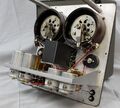1603-A: Difference between revisions
Jump to navigation
Jump to search
No edit summary |
No edit summary |
||
| Line 28: | Line 28: | ||
* [[Media:GRwiki Exp 1603-A 07_1955.pdf|GR Experimenter July 1955 describing the 1603-A]] | * [[Media:GRwiki Exp 1603-A 07_1955.pdf|GR Experimenter July 1955 describing the 1603-A]] | ||
* [https://www.pa4tim.nl/?p=4456 GR 1603-A @ Fred PA4TIM's page] | * [https://www.pa4tim.nl/?p=4456 GR 1603-A @ Fred PA4TIM's page] | ||
* [https://www.youtube.com/watch?v=gl6FEzfTWgQ Genrad 1603 used to measure audio transformers] @ YouTube | * [https://www.youtube.com/watch?v=gl6FEzfTWgQ Genrad 1603 used to measure audio transformers] by ElPaso TubeAmps @ YouTube | ||
==Photos== | ==Photos== | ||
Latest revision as of 05:09, 9 July 2024
The General Radio 1603-A is a Z-Y impedance bridge introduced in Catalog O (1956) that remained available through Catalog T (1968).
Known as the bridge that always has an answer, its claim to fame is that it can be balanced for any impedance connected to its terminals. The 1603-A is accurate at audio frequencies from 20 Hz to 20 kHz. It requires an audio oscillator and detector for operation.
The 1603-A directly measures the quadrature components of a complex impedance Z = R + jX, or a complex admittance Y = G + jB. The unknown Z or Y may lie in any of the four quadrants of the complex plane, since this bridge can measure both positive and negative values of R and G as well as X and B.
Specifications
- Frequency Range: 20 Hz to 20 kHz
- Impedance and Admittance: -infinity to +infinity
- Accuracy (with unknown grounded): 1% (see manual)
Links
- GR Experimenter July 1955 describing the 1603-A
- GR 1603-A @ Fred PA4TIM's page
- Genrad 1603 used to measure audio transformers by ElPaso TubeAmps @ YouTube






